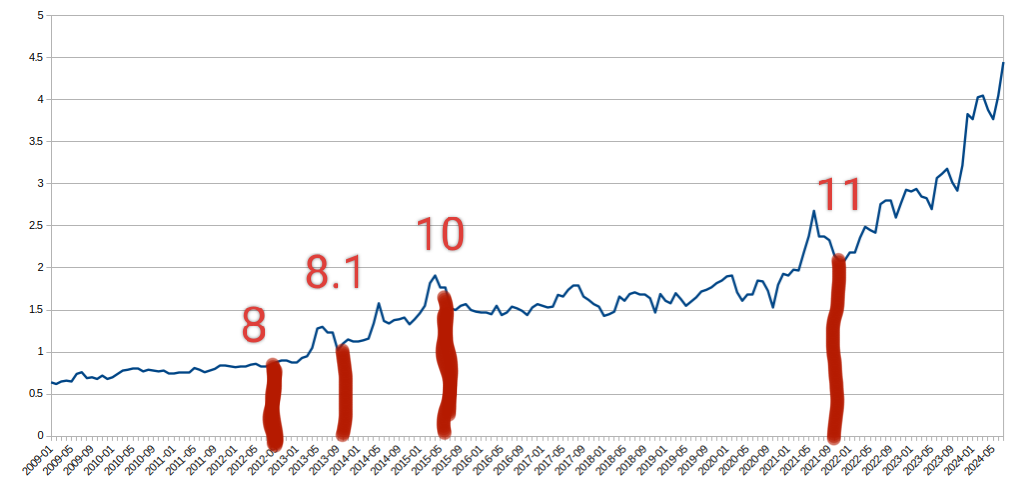References
- “Linux hits another all-time high for July 2024 according to Statcounter”. Liam Dawe. GamingOnLinux. Published: 2024-08-01T11:35Z. Accessed: 2024-08-04T19:21Z. https://www.gamingonlinux.com/2024/08/linux-hits-another-all-time-high-for-july-2024-according-to-statcounter/.
The only line which I demand must only go up.
Yes
300% percent Linux market share by 2070!
This is a big deal. More Linux users leads to more Linux-supporting software, which leads to more users.
The biggest resistence is front-loaded into that first few percent.
In my opinion, advancements in binary compatibility accross distributions (Flatpak, AppImage, …) and broad compatibility with Windows software (Wine and forks… thank you Valve!) are making Linux easier to use.
This is a big deal. More Linux users leads to more Linux-supporting software, which leads to more users.
It should correlate with more donations , the donations linux mint are getting are also growing fairly consistently. the same is true for the “Open Source Collective” which is a fiscal host for open source projects.
At the same time, I feel like nowadays there’s less forums or places people can ask help with, although today ChatGPT can be a good help with newbie questions.
I feel like nowadays there’s less forums or places people can ask help with
I’m sorry, what??
There are more places than ever to find support. The Ubuntu forums, EndeavourOS forums, Manjaro forums, NixOS forums, SUSE forums, etc. Just about every larger distro has it’s own forum and they’re all very active. Then there are general Linux, Linux “newbie”, Linux help communities on the various Lemmy servers and (whether you like it or not) on Reddit also. Then there’s Mastodon. General tech forums like Level1Tech, Hacker News, etc.
The Arch wiki is also great.
… Even if you don’t use Arch Linux.
I dont know about that. There is Lemmy and a ton of Distros or respins I know have forums.
Some have chatrooms which totally suck for finding information.
To the moon, boys!
the only chart I care about
💎👐
In 2424 108.5% of people will use linux 👍
It’s data extrapolation time!
Why would you use a linear approximation, this clearly looks like exponential growth (for the last 9 years).
Linux will obviously achieve 100% market share within the next few years.

Someone should add major Windows releases on the X axis. There’s gotta be some correlation.
I had dabbled in it off and on since LONG LONG ago, but I only went full time (no dual boot) since windows 11 release. So yeah, I bet there’s lots others like me.
I had been dual booting for a while with Windows 11/Fedora until one day I needed to update the BIOS on my motherboard. Windows decided it was too big of an upgrade and wanted me to activate again. I called support, and they said that I had used up all my activations and would need to buy a new copy.
Thanks Microsoft, for helping me switch full time to Linux!
They force you to re-buy the same software for literally the same hardware. That’s insane.
For more context, it was a Windows 8.1 license I upgraded to 11. But yes, still crazy they let it “expire” when using the exact same hardware. My theory is that because the BIOS update changed my TPM keys, Windows couldn’t tell that it was the same hardware.
wait that’s a thing? I guess I’d never find out because I always used whatever activation method was available on MDL for each version for the odd time I used windows.

Thanks! It does indeed look like people try out Linux before the new Windows release. Then it returns to the slower adoption trend.
It’s also interesting because you can also see a steeper line corresponding on the “worse” windows versions (8, 11) while it’s relatively stagnant during windows 10
deleted by creator
That spike in 2021 looks to be around the win11 release date, although it pretty much dropped the same amount after. Does look to be a sharper trend in adoption since then, though (with all of the caveats about what the data is measuring of course).
Actually windows market share is growing as well. It’s MacOS that’s dropping
I really really hope this will lead to some major UX improvements as more “normal people” start trying to use Linux. Currently, it’s still often too complicated or cumbersome, if not downright buggy.
Example: I run Kubuntu and about 20% of the time when I plug in my external monitors, all my windows just crash. Things need to get to a state of “just working” much more often and in many more cases. I hope this surge of users will motivate people to move towards that or maybe bring in more contributors to advance that area.
I installed a new GPU and it changed the device name of my NIC so all my network setup suddenly broke.
Now every ~5th time I wake my computer from sleep the monitor comes on briefly and I then get a black screen. If I turn the monitor off and back on it fixes it.
Would be cool to have more people on Linux finding and fixing these little details.
Would be cool to have more people on Linux finding and fixing these little details.
Unlikely to happen. This is very complicated low level stuff that’s often completely undocumented. Often the hardware is buggy but it works with Windows/Mac because that’s what it’s been tested with, so you’re not even implementing a spec, you’re implementing Windows’ implementation.
Also the few people that have the knowledge to do this a) don’t want to spend a ton of money buying every model of monitor or whatever for testing, and b) don’t want to spend all their time doing boring difficult debugging.
I actually speak from experience here. I wrote a semi-popular FOSS program for a type of peripheral. Actually it only supports devices from a single company, but… I have one now. It cost about £200. The other models are more expensive and I’m not going to spend like £3k buying all the other models so I can test it properly. The protocol is reverse engineered too so… yeah I’ll probably break it for other people, sorry.
This sort of thing really only works commercially IMO. It’s too expensive, boring and time consuming for the scratch-an-itch developers.
If Linux adoption reaches a critical mass then the manufacturers will start fixing these issues themselves. If Linux was 30% of all users and AMD paid a team to fix Linux support, they would eat the competition alive, but if Linux is 3% it doesn’t make sense for them to devote resources to fixing Linux.
True but it’ll have to be like 10% and I don’t see that happening ever really. Unless Microsoft really screws up, which to be fair they are doing their best.
deleted by creator
Use udev rules to get a stable name.
I run Kubuntu and about 20% of the time when I plug in my external monitors, all my windows just crash.
This one’s weird.
GPU issue? Or something with older OS?I use KDE and have never seen a similar problem.
Sure, stuff may get wonky, but crashing windows on monitor detection is a big deal.
I have a Framework laptop (Intel GPU) with Arch and KDE, and while I’ve never seen all windows crash when connecting an external monitor, I wouldn’t call it out of the ordinary for one or two to crash after I connect one, especially if I try to drag one to a new position right after.
I never had such a problem with my old laptop (which had a burnt out nVidia GPU and was running on the Intel iGPU), so could it be a regression with Wayland.
I gotta check this out. Guess I’m going to wear down a DP connector this week!
I can no longer check it on the Laptop though (died), but on my AMD system, so at least if the problem is actually KDE, it should show up. Otherwise, I’ll just count myself unlucky and unable to reproduce.
ThinkPad X1 Carbon Generation 10
And that’s ~2 years old too, so Ubuntu should usually not be a problem.
Interesting.
KDE isn’t focused as much on stability or having a clean UI. However, it is very customizable.
If you want something easier look at gnome or cinnamon
clean UI
I personally find their UI much cleaner than Gnome or cinnamon, but to each their own.
Great for portable gaming machines ✅️
Resurrect old Pc/laptops ✅️
Great for Servers ✅️
Gratis and open sources✅️
Feed multiple derivated systems with his codes (for free) ✅️
Is not Windows ✅️✅️✅️
If I wasn’t already sold, I’d be sold.
Thanks Steam and Microsoft!
For liberty!
For freedom ☠️
10% growth in 1 month is huge. If that keeps up then everyone will be on Linux soon.
Get this man in front of some shareholders
So here’s the plan:
-
Grow market share
-
Grow profit
I take it step 3 is ??
-
Do you mean that as a relative 10%? Because this chart maxes out at 5%.
Yeah, relative. From ~4% to ~4.4%.
It feels really good to be a part of this wave!
A Linuxponential curve!
In 2 months, it has increased by over 0.5%
If the growth continues, it will reach 100% in 30 years!
My god, does that mean we’ll be at 200% in 60 years?😱
In 120 years, people will each have 4 linux computers
It has always been
You could almost be forgiven for not realising that every point on that Y axis is a mere half percent…
All the usual caveats apply. Linux still comes behind “unknown” in Statcounter, whose methodology is… dubious, and the Steam survey has Linux at 2%, flat from the previous checkpoint.
It makes sense that Steam is lower, since gaming historically has been one of the biggest things keeping people from switching. That’s no longer the case, but it’ll take time to convert people.
Also, putting half percent points from 0 to 5 on the y axis, while the x axis is four month intervals since 2009, makes this growth look way more significant that it really is…
The shape of the curve, ie the trend, imo, is far more important than the current marketshare.
Yeah there’s no way I trust their methodology has stayed that stable over 15 years. Hell if you just look in the last year supposedly 3% of global users jumped from Mac to Windows in a single month (Nov 2023).
There are also loads of new Linux device classes that may have Linux in their user agent but aren’t really “the year of the Linux desktop” that you’re thinking of. It seems they try to count ChromeOS (though badly - seems like “Unknown” contains a lot of ChromeOS depending on the month), and obviously Android, but what about Steam Deck? Smart devices with web browsers built in? Is your Tesla desktop Linux?
I’d buy it’s gone up; not to 4% though. I would be moderately surprised if 4% of web users had even heard of Linux.
I would be moderately surprised if 4% of web users had even heard of Linux.
Patently absurd
Same, I’d like to see this compared to other sources. Steam also tends to swing wildly based on the Chinese market
The year of the Linux desktop I’m thinking of was like 2008. That was then it became perfectly usable on the desktop and I haven’t had to switch back since.
I don’t understand why anyone care’s what Linux’s “market share” is. It’s open source, no one makes money when someone installs Linux.
it’s still a market, and “free” is still a price point
Yeah there’s no way I trust their methodology has stayed that stable over 15 years.
There’s likely some decently sized error bars. I’m not sure how accurate Statcounter is. It would be nice to see data independently acquired by another service to increase the confidence level. If Statcounter is only checking the useragent, then the accuracy of the data is certainly lacking, but the trend is worthy of note, or, at least, further investigation.



















